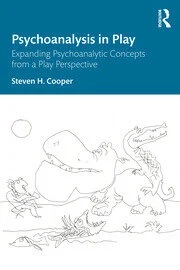Psychoanalysis in Play: Expanding Psychoanalytic Concepts from a Play Perspective

Book Details
- Publisher : Routledge
- Published : 2025
- Cover : Paperback
- Pages : 132
- Category :
Forthcoming - Category 2 :
Psychoanalysis - Catalogue No : 98123
- ISBN 13 : 9781032941943
- ISBN 10 : 1032941944
Reviews and Endorsements
Psychoanalysis in Play is a significant contribution to contemporary psychoanalysis, offering a nuanced exploration of the interplay between fantasy, isolation, and concealment and the subtle ways patients construct protective illusions, sustain unconscious erotic ties, and shield forbidden attachments through creative disguises. Cooper skillfully integrates classical psychoanalytic foundations with the ideas of Winnicott, Bion, Britton, and Steiner, mapping a continuum from neurotic defenses to more entrenched schizoid dynamics. Central to this process is the concept of “playing,” which the author masterfully presents through vivid clinical examples as both a therapeutic tool and a lens for understanding how patients reveal, explore, and transform unconscious patterns. Equally compelling is the book’s exploration of temporality, the delicate construction of trust, and the analytic setting’s capacity to foster creativity and psychic growth, offering fresh perspectives on the therapeutic process. I strongly recommend it to analysts, therapists, and students interested in the treatment of psychological suffering, as well as to scholars in the human sciences for its profound reflections on the fabric of the human psyche.
Giuseppe Civitarese, author of Psychoanalytic Field Theory: A Contemporary Introduction, London 2023
To read the work of Steven Cooper is to be invited into a world of thoughtfulness. In Psychoanalysis in Play he displays his adeptness with psychoanalytic theory utilizing the multiple vertices that accompany an active analytic interrogation of transference-countertransference. His reader is expertly guided through areas of play and paradox, fixation and fantasy, as he uses both classical and contemporary theorists to think about his patient’s inner object worlds, carefully finding his way with each individual patient in each individual moment, seeking to determine who he may be for his patient or what he might be holding of theirs, and what his countertransference may be offering to bring into his awareness. Cooper’s description of his analytic work with his patients demonstrates his virtuoso abilities to play what Whitman called "the instruments inside us."
Bruce Reis, PhD, FIPA, BCPsa, North American Regional Editor International Journal of Psychoanalysis

